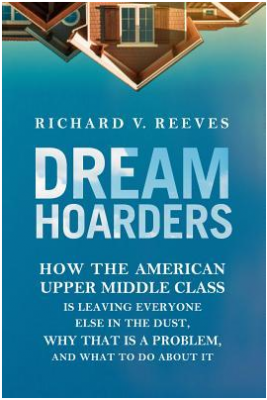Dream Hoarders by Richard V. Reeves
 This is a truly important book. Progressive politics has supported the idea of the 1% vs the 99% and that has unburdened affluent liberal thinkers from taking responsibility as part of the top 20%. There are opportunities and advantages that accrue to those in the top quintile that we are reluctant to give up – everything from the 529 savings accounts for our children’s education, to how our neighborhoods are zoned, legacy admissions to Ivy League universities and the home mortgage interest tax credit.
This is a truly important book. Progressive politics has supported the idea of the 1% vs the 99% and that has unburdened affluent liberal thinkers from taking responsibility as part of the top 20%. There are opportunities and advantages that accrue to those in the top quintile that we are reluctant to give up – everything from the 529 savings accounts for our children’s education, to how our neighborhoods are zoned, legacy admissions to Ivy League universities and the home mortgage interest tax credit.
I was fortunate to hear Richard Reeves talk about this book at the Aspen Institute last week in DC. He makes a convincing case for how this country, so proud of it’s founding upon the ideals of social mobility and meritocracy, is becoming more rigidly stratified into classes. As a native of the United Kingdom who is now an American citizen, a resident of Montgomery County, Maryland, and a senior fellow in Economics at the Brookings Institution, he brings an unusual combination of perspectives to this study.
He’s draws on the research of other scholars to make his case, as well as from Robert Putnam’s Our Kids, J.D. Vance’s Hillybilly Elegy, and Charles Murray’s Coming Apart. From both a data standpoint and anecdotal examples, Reeves paints a picture of our country that not everyone is willing to see.
Over the last three or four decades, income inequality has increased in the United States, but only at the top. There has been no increase in inequality in the bottom 80 percent of the population. The break point is around the eightieth percentile, as David Grusky confirmed in a recent comprehensive study. “The income gap between professional-managerial class and all other classes is now very large,” Grusky concludes, “whereas the income gaps among the remaining classes are not much different from what prevailed in 1979.”
The whole concept of “hoarding opportunities” is about the cumulative effect it has not only on income but the other factors that feed into a class based system – where we went to college, what kind of employment we have and what neighborhoods we live in.
Reeves hits one of my pet peeves very hard throughout the book – internships. How they are distributed, who gets them, the fact that most are unpaid (and largely unregulated in any way) and why increasingly they are more important to better career opportunities. The chart on page 117 show internships ranked first in importance by a survey of employers, ahead of seven other factors such as college reputation, GPA, volunteer experience and employment during college. In other words, it’s become a prerequisite to the better jobs while the distribution of those internships are vastly inequitable. One of the most telling examples in the book is how NYC Mayors Bloomberg and de Blasio sought waivers from the city’s Conflict of Interest Board in order to hire their own children as summer interns. So much for high minded liberal ideals of economic opportunity.
Throughout the book there is an emphasis on educational inequality, inherited wealth and class, how residential zoning factors into who is in the local public schools and also about the gaps in the quality of parenting.
One of the most surprising subjects in the book, and one I fully support, is his proposal in Chapter 7 Sharing the Dream around “Reduce Unintended Pregnancies Through Better Contraception.” Finally, a recognition about how unintended pregnancies affect both the parent and the child and place them both at a disadvantage for economic stability and social mobility. He talks about how our antiquated system of sex education and access to reliable contraception almost ensures that we will continue to have an entire class of economically disadvantaged Americans made up of single parent households with children.
While I applaud his research on LARCs and an honest discussion about unintended pregnancies, I will ding Richard Reeves for not saying one single word about abortion. Talk about placation politics. As a senior fellow at the venerated Brookings Institution and a researcher who wants to influence public policy, I can see why he would avoid discussing something summarily dismissed by every conservative he’s trying to persuade to his larger vision.
However, American women have a legal right to access abortion services in this country as decided by the Supreme Court of the United States in Roe v. Wade in 1972. Ever since that decision, conservative forces have systematically tried to dismantle access to those legally protected services in states across the country. EVERY SINGLE DAY there are headlines about challenges to the shut down women’s abortion clinics from Kentucky to Louisiana, Mississippi to Arkansas, Texas to Virginia. To simply ignore that as a contributing factor to the economic forces he so thoroughly examines in this book is a glaring weakness. Preventing unintended pregnancies is a laudable goal. Legislatures dictating whether women will bear the children of those unintended pregnancies is a reality he does not address. Clearly women of the upper middle class can buy abortion services no matter where they live. It’s only poor women who suffer from the lack of access to services. Talk about hoarding of opportunities!
I would highly recommend this book. Particularly to my fellow travelers in the top economic quintile of Americans. I’ve seen the enemy and it is US. The first step to solving a problem is recognizing it, naming it and owning our responsibility for it.